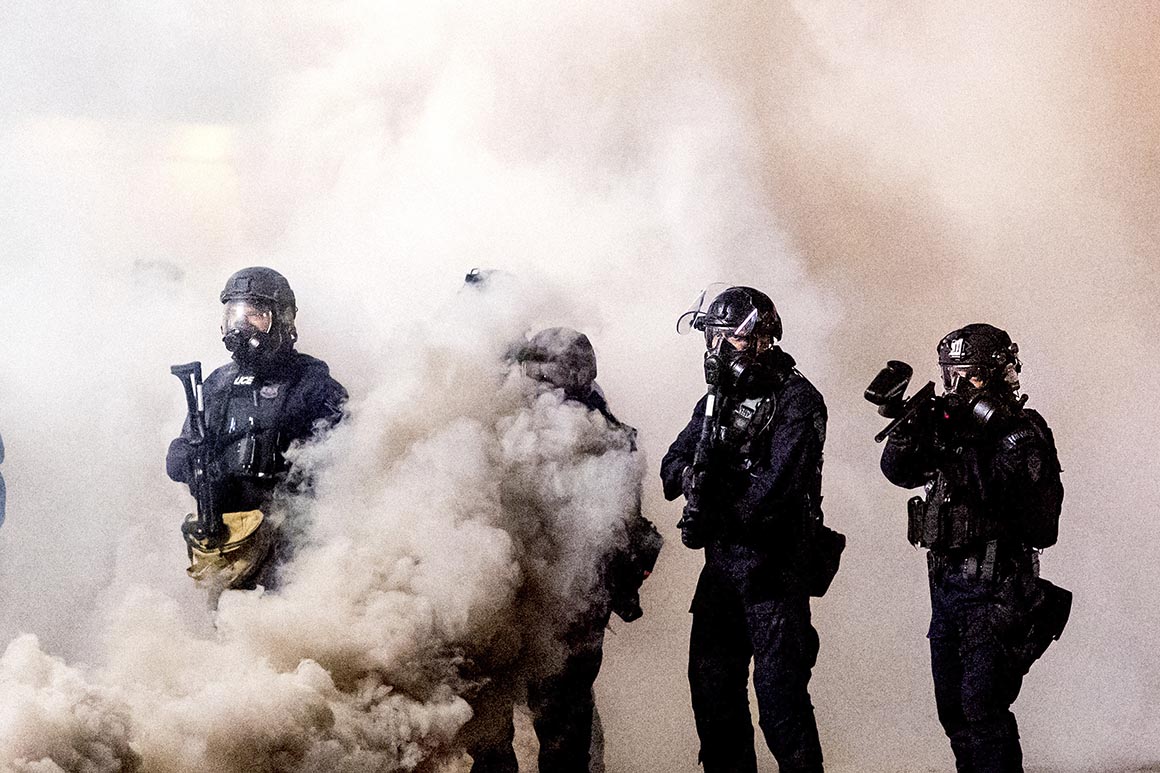
A judge on Friday denied the Oregon attorney general’s request for a temporary restraining order to rein in the activities of federal agents responding to protests and unrest in Portland.
As part of a lawsuit against federal agents in the city, Oregon Attorney General Ellen Rosenblum had requested that federal officers clearly identify themselves when seizing protesters and stop arrests without probable cause.
But U.S. District Court Judge Michael Mosman rejected the motion, arguing that she did not present enough evidence that future harm would continue at the hands of the agents. The judge also raised doubts about whether the state had legal standing to pursue a suit on behalf of protesters or others who might be targeted by the federal officers.
The decision comes a day after another federal judge ruled in a separate case that federal agents would have to stop using force on journalists reporting on the protests.
Federal agents from the Department of Homeland Security and the U.S. Marshals Service arrived in Portland as protesters marched on the city in the wake of George Floyd’s death. Several reports and videos shared on social media showed agents clad in camouflage seizing activists from city streets and whisking the protesters away in unmarked vehicles. The agents also reportedly used force on journalists to clear them from protest areas.
Videos of the agents show the uniforms are clearly marked as "POLICE" but activists say it is often unclear what agency the armed officers represent. The military gear and attire evokes fear and suspicion, critics say.
The agents appear to be part of what court filings have described as a "rapid deployment force" that is part of "Operation Diligent Valor," a Department of Homeland Security-led effort to protect federal courthouses and office buildings from vandalism, arson and other damage.
Last week, Rosenblum sued the agents, listed as John Doe 1-10, and a number of federal agencies, accusing them of violating protesters’ constitutional rights by arresting them without probable cause. David Morrell, an attorney for the federal government, argued before the court that Rosenblum’s motion for a temporary restraining order was based on "a few thread witnesses and a Twitter video."
In a 14-page ruling Friday, Mosman wrote that Rosenblum’s case was a "highly unusual" one that does not meet the standards for a temporary restraining order, particularly for barring future conduct rather than harm already done to protesters. Mosman wrote that Rosenblum only used two examples of what she characterizes as unlawful seizures and did not present enough evidence that the seizures are likely to continue.
"The State could try to show, for example, that all of Defendants’ seizures are illegal, or that they are under orders to fail to identify themselves or to make random arrests without probable cause," Mosman wrote. "The state has shown none of this. It has presented no evidence of any official orders or policies and has presented no evidence that these allegedly illegal seizures are a widespread practice."
Mosman also faulted the state’s lawyers for hyperbolic arguments, including describing those arrested as being “disappeared,” which the judge said evoked the mass murder of tens of thousands of political opponents by a military junta in Argentina in the 1970s and 1980s.
“Even taking every word of the State’s arguments and evidence at face value, this seems out of proportion,” wrote Mosman, an appointee of President George W. Bush.
Rosenblum later issued a statement pushing back on Mosman’s doubts on the state’s ability to sue on behalf of the protesters. Protesters can sue for individual damages, she said, but cannot sue to stop what she called the unlawful conduct of federal agents in the future.
"Today’s ruling suggests that there may be no recourse on behalf of our state, and if so that is extremely troubling," Rosenblum said.
She added: "While today the court declined to issue an immediate order putting a stop to those tactics, we are, nevertheless, hopeful these abuses will stop and no other Oregonians will be subject to them or to the chilling effect they have on the right to engage in peaceful protest."
Mosman’s order came hours after the Justice Department announced federal charges against 18 protesters in connection to demonstrations at a federal courthouse in Portland. Those charges included assaults on law enforcement officers, destruction of property, looting, arson, and vandalism.
Late Friday, another federal judge blocked Seattle’s new law prohibiting police from using pepper spray, blast balls and similar weapons that was passed following confrontations with protesters, according to the Associated Press.
The Seattle Times reports that U.S. District Judge James Robart at an emergency hearing granted a request from the federal government to block the new law, which the Seattle City Council passed unanimously last month.
The U.S. Department of Justice, citing Seattle’s longstanding police consent decree, argued that banning the use of crowd control weapons could actually lead to more police use of force, leaving them only with more deadly weapons.
Josh Gerstein contributed to this report.
Source: politico.com
See more here: news365.stream






